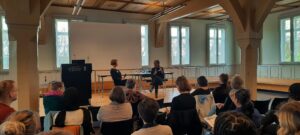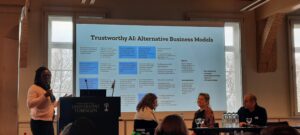The Center for Rhetorical Science Communication Research on Artificial Intelligence (RHET AI Center), together with the International Center for Ethics in the Sciences and Humanities (IZEW) and the Collaborative Research Center 923 "Threatened Orders" at the University of Tübingen, hosted a symposium on "Social Justice and Technological Futures" on May 2nd and 3rd, 2023. Researchers and practitioners from around the world were invited to the "Alte Aula" in Tübingen to discuss the global connections between social, cultural, political, and economic injustices caused by new technologies. For two days, the participants used the symposium as a platform to exchange views on the theory of justice and future-oriented perspectives. The RHET AI Center participated with three international speakers from South Africa, Brazil and Colombia/Spain, an institutional welcome, its own thematic panel and the screening of a thematically relevant film as part of the supporting program.






The symposium was opened by the heads of the organizing institutions: Prof. Dr. Regina Ammicht Quinn (IZEW), Prof. Dr. Olaf Kramer (RHET AI Center) and Prof. Dr. Astrid Franke (Collaborative Research Center 923 "Threatened Orders"). Afterwards, Leica J. Brooks of the Southern Poverty Law Center spoke with Regina Ammicht Quinn about the main theme of the symposium: Social Justice.
In the first thematic panel on "Ethics, Economy, Equality", Koliwe Majama (Mozilla Foundation, Zimbabwe), Sofia Scasserra (Tres de Febrero University, Argentina) and Dr. Scott Timcke (ICT Research Africa, South Africa) contributed critical reflections on global developments in the context of artificial intelligence. Dr. Scott Timcke, who came to Tübingen at the invitation of the RHET AI Center, drew attention in his presentation to the "slow violence" to which the countries of the Global South are exposed through the current practices of the AI industry. Dr. Lou Brandner of the IZEW moderated the panel on ethical issues and led the subsequent discussion.
Tübingen-based media scholar Dr. Anne Burkhardt, postdoc at the RHET AI Center and expert in decolonial theories and artificial intelligence with a special interest in audiovisual AI discourses in the Global South, moderated the RHET AI panel "AI, Imagination, and Creativity" in the afternoon. It was opened by Colombian director and film producer Jorge Caballero Ramos, who researches AI and film at the University Pompeu Fabra in Barcelona and runs the Colombian-Spanish production company Gusano Films. Using selected film examples, he explained how artificial intelligence is revolutionizing creative work with (moving) images and redefining the boundaries of creativity. The behind-the-scenes look at his films showed how artificial intelligence can be used to improve scripts and dialogues, to analyze visual material, to create animations, or in film editing, and what opportunities this opens up for productions from the Global South in particular — for example, in terms of financial resources.




The second speaker on the panel was Joana Varon from Brazil, Executive Director and "Creative Chaos Catalyst" of the feminist organization Coding Rights, Fellow of Technology and Human Rights at the Carr Center for Human Rights Policy at Harvard Kennedy School, and member of the Berkman Klein Center for Internet and Society at Harvard University. In their activist work, Varon and her colleagues not only fight against structural inequalities (such as gender or the North-South divide), but also develop alternative — fairer, more diverse and holistic — visions of new technologies. The return to nature and indigenous cultures as well as the decolonization of technology (imaginations) play a central role. These are expressed in visualizations and various digital formats that Varon and her team design and distribute online.
To conclude the first day of the symposium, the Gusano Films production Robin Bank (director: Anna Giralt Gris; producer: Jorge Caballero Ramos) was screened at the Arsenal cinema. Robin Bank is a documentary about the Catalan "hacktivist" Enric Duran, who succeeded in robbing the big banks and their credit system of half a million euros based on stock market speculation, which he donated to activist causes. The subsequent audience discussion with the film's producer, moderated by Dr. Anne Burkhardt, focused on the question of whether Duran's illegal actions can appear ethically legitimate, and to what extent globalized and increasingly technologized hypercapitalism can — and should — be beaten at its own game.





